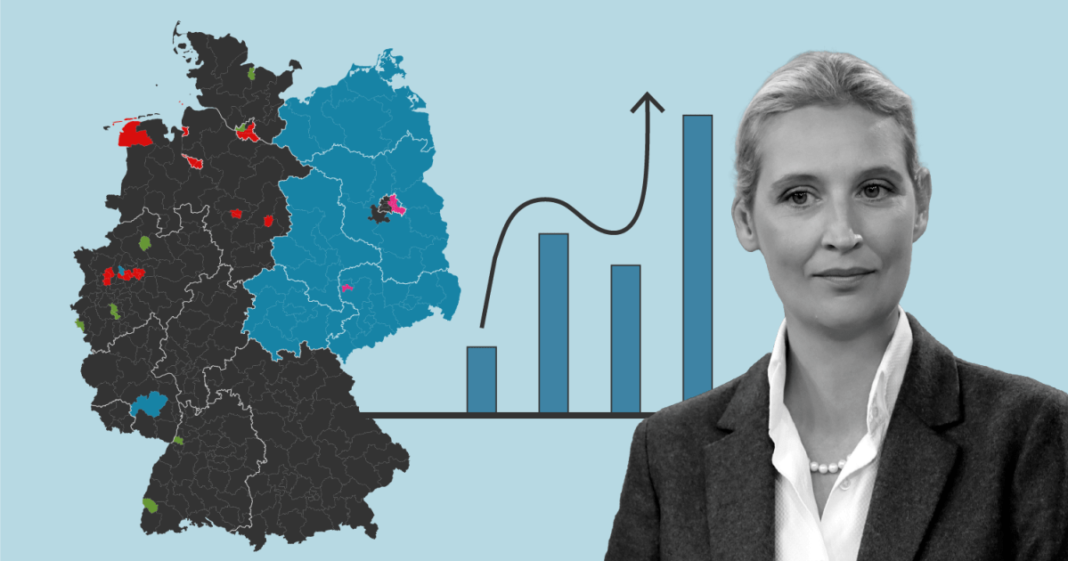EXPLAINER
The AfD doubles its share of the vote from 10.4 percent in 2021 to 20.8 percent, becoming Germany’s second largest political party.
In a historic shift in Germany’s political landscape, the far-right Alternative for Germany (AfD) has surged to become the second largest party in the Bundestag, winning 20.8 percent of the vote in federal elections.
The Christian Democratic Union (CDU) was the biggest vote-getter on Sunday, winning 28.6 percent alongside its sister party, the Christian Social Union. The CDU has ruled out forming a coalition with the AfD, which presents a challenge in creating a stable government.
The AfD has articulated several key policies, which have proved popular with many German voters. They include:
- Immigration controls, including the rejection of asylum applications and “remigration” initiatives that would deport foreign nationals
- Economic overhauls, such as abandoning the euro and reintroducing the German mark
- Foreign policy changes, such as leaving the NATO alliance
- Reversing energy transitions, such as dismantling existing wind turbines and returning to nuclear energy
Who is the AfD leader Alice Weidel?
Alice Weidel, a former finance professional with a doctorate in economics, joined the AfD in 2013 and quickly rose to leadership posts. Initially a eurosceptic party, the AfD shifted towards nationalism and strict immigration policies with Weidel at the forefront.
Weidel capitalised on voter frustration, particularly in the former East Germany, by opposing immigration, green energy policies and globalisation. Using social media and high-profile interviews, including with tech billionaire Elon Musk, to expand her influence, Weidel’s “remigration” and nationalist policies have garnered her and the AfD attention.
How has the AfD performed in the past?
The party’s electoral gains mirror rising dissatisfaction among voters on migration, the economy and mainstream parties.
Initially formed as a eurosceptic party, the AfD secured 4.7 percent of the votes in its first federal elections in 2013, falling below the 5 percent bar required to enter the Bundestag.
In the 2017 federal elections, the party gained 12.6 percent of votes and entered the Bundestag with 94 seats. It was the third largest party in the German parliament, its popularity driven by then-Chancellor Angela Merkel’s 2015 refugee policy, which allowed more than a million asylum seekers into Germany.
While still performing strongly in eastern Germany, the AfD’s vote share dropped in the 2021 elections to 10.3 percent, making it the fifth largest party in the Bundestag. The party struggled to maintain its anti-immigration rhetoric with concern at the time focused more on the handling of the COVID-19 pandemic.
In Sunday’s elections, the AfD doubled its vote share from 2021 as the election campaign focused on immigration and the economy.
Where did the AfD perform best?
In Sunday’s elections, the AfD won votes in almost every single German constituency.
Historically, the AfD performs well among voters in eastern Germany due to post-reunification disparities that have emerged as the east has lagged behind western Germany in economic development and employment opportunities.
The AfD has also done well off the back of its antiestablishment rhetoric with mainstream political parties less deeply rooted in eastern Germany due to its communist past.
In a couple of western German constituencies, the AfD won but was only marginally ahead of the second most popular parties in those areas.
That said, the Left party has also found success in eastern Germany despite declining support in recent years. The Left evolved from the Socialist Unity Party, which ruled East Germany until reunification in 1990 and has stronger ties to older voters there.

Will the AfD be part of Germany’s coalition?
Mainstream parties have ruled out forming a coalition with the AfD because of its nationalist policies and far-right tendencies. As such, Germany’s coalition options are now limited essentially to one, given the voting results.
A grand coalition including the CDU, the CSU and the Social Democratic Party (SPD) is the most likely option with CDU leader Friedrich Merz as chancellor.








